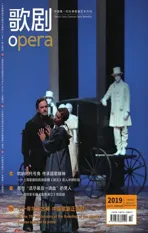希望在天际:迪拜歌剧院首席执行官贾斯帕·霍普的世界观
2019-11-19司马勤KenSmith编译李正欣
文:司马勤(Ken Smith) 编译:李正欣
从职业生涯规划的角度来看,离开一个已建立超过百年的、规模庞大且历史悠久的机构,单凭直觉转职至一个“文化沙漠”中的新设施,有点不可思议。可是,经过三年的光景及六百多场演出,贾斯帕· 霍普(Jaspar Hope)对于离开伦敦皇家阿尔伯特音乐厅(Royal Albert Hall),走进新建成的两千座的迪拜歌剧院担任其首位行政执行官的这个决定,完全不后悔。其实,皇家阿尔伯特音乐厅多年来一直是古典音乐与商业项目兼容并蓄,将这个备受英国人爱戴的运营方式套用到迪拜歌剧院上,也是再好不过。迪拜除了本地人以外,还有不少来自世界各国旅居当地的人群,也可算是一个国际舞台。
同样,霍普也拥有胜任迪拜歌剧院领导者的背景与关系。他出生于南非,父亲是著名小说家克里斯托弗· 霍普(Christopher Hope)。年少的贾斯帕跟随父母移居欧洲,母亲后来担任传奇小提琴家兼指挥家耶胡迪·梅纽因(Yehudi Menuhin)的私人经纪人。霍普的兄弟是小提琴家(最近也担纲指挥一职)丹尼尔· 霍普,丹尼尔也曾登上迪拜歌剧院舞台献艺。自迪拜歌剧院开门迎客来,从多明戈担任主角的开幕盛典,到《悲惨世界》进驻剧院作三周巡演秀的每一场演出,都是连接迪拜与世界的桥梁。
虽然迪拜歌剧院是一个纯粹的商业机构,这一点不需任何辩解——整座剧院由伊玛尔房地产公司(Emaar Properties)建造及营运,毗邻迪拜购物中心(Dubai Mall)。但尽管歌剧院是作为商业架构来运营,却一点都没有减少它的国际精神。霍普一到迪拜,就引进了BBC 逍遥音乐会到这个中东据点——该项目与他之前在皇家阿尔伯特音乐厅的工作关系密切,因此引进工作易如反掌。当然,他也费尽心思,关注迪拜的其他族群。比如,请来了以伦敦为基地的西塔琴高手安诺舒卡·香卡(Anoushka Shankar,拉维·香卡的女儿)登台,服务于当地的印度族裔;还邀请了百老汇大明星丽娅·萨隆加(Lea Salonga),灵感应当是来自迪拜的菲律宾居民。
至于策划歌剧方面,霍普深知他的观众群可能是第一次看那些经典剧目,因此他怀着开放的心态与国际精神,把眼光投放于欧洲这个音乐中心以外的“远方”。上海歌剧院在迪拜做客的日子里,霍普腾出一段安静的空当,详细谈到他从中国邀请到歌剧团队作迪拜《图兰朵》首演的缘由。
你为何邀请上海歌剧院到迪拜歌剧院演出?
三年前,迪拜歌剧院举行开幕盛典之后,我就希望引进一个《图兰朵》的制作。可惜,这是一个十分复杂的议题。首先,这部歌剧需要众多演职人员的参与。老实说,这部歌剧在全世界有很多不同版本的制作,但它们都达不到我所要求的、值得把《图兰朵》首次带上迪拜歌剧院舞台的质量。我花了很多时间,最终在上海歌剧院找到了我理想的合作伙伴。上海歌剧院的制作很棒,为迪拜歌剧院的第四个演出季拉开帷幕,真的再合适不过。
我猜,对你来讲,请一家中国歌剧院来搬演一个讲述中国故事的作品,具有绝佳的优势吧。
是的,我们成功地邀请一家中国歌剧院演出《图兰朵》,这点非常重要。但是,虽然这讲述了一个中国故事,作曲家却来自西方,所以这部作品从诞生之初就在东西方之间建立起了连接。再者,世界上还有哪个地方能比迪拜更合适来呈献这个制作呢?起码我们是这样想的。迪拜刚好位于东西方之间,在丝绸之路上也刚好连接起欧洲与亚洲。
首演那天,歌剧院座无虚席。你们一直以来都拥有这么热情的观众吗?
《图兰朵》三场演出的票房都十分理想,我觉得很欣喜。每当你启动一个新项目时,都无法预料到最后关头,观众会不会踊跃购票,演出会不会深受欢迎。在过去的三年里,我们不懈努力,成功地建立起热衷于西方歌剧的观众群。倘若《图兰朵》的首演当晚不是座无虚席,我才一定会感到惊讶。
你曾经带领过搬演世界级水平歌剧演出的剧院。请问,上海歌剧院的制作包含了什么元素,令你确信这是最适合迪拜观众群的《图兰朵》制作?
当我第一次在迪拜歌剧院里看到上海歌剧院的团队进行排练时,有很多东西令我印象深刻。首先,歌剧制作的规模之大令人赞叹——舞台上有很多演员。除了演职人员的数量外,我觉得上海歌剧院版《图兰朵》所用的布景既简单又漂亮。转换场景时所用的投影效果,也确实增强了戏剧的叙事性。这是一个很聪明的处理手法,把复杂的剧情用简单的方式陈述出来。我敢肯定,当迪拜的观众首次欣赏这部歌剧时,他们会被这个制作的很多方面所吸引,更容易将情感投入于其中。在整个演出过程中,我的眼球被舞台上的不同事物所吸引:投映的影像、色彩夺目的服装,以及聚焦于舞台上人物与布景的灯光设计。当然,你还有机会欣赏到普契尼那具有魔力的音乐,并沉浸于洪亮的歌声之中。从视觉效果上来说,这个歌剧制作壮观至极——那是最令我兴奋的一点。

上海歌剧院版《图兰朵》在迪拜歌剧院首演那天,剧院座无虚席(摄影:蒋海瑛)
很明显,这个合作关系需要很长的准备时间。这个过程是怎样推进的?
我们双方都进行了的多方面的努力。上海方面的团队很早就来迪拜歌剧院进行了考察,大家讨论剧目、研究歌剧演出多少场次才更适当;接着,我们探讨运作的细节问题。去年,我也到访了上海,除了在世界城市文化论坛讲演外,我还与上海歌剧院进一步探讨了巡演的各种事宜。整个过程当然复杂,但我必须声明,有机会与上海歌剧院这个专业且具有多年巡演经验的团队合作,我觉得很兴奋。因为每当问题出现,都需要很大的信心与多年累积的经验,才能将这些问题顺利化解。此次双方的合作过程非常顺畅,我们也希望为将来的合作奠定良好的工作关系。
迪拜歌剧院所策划的剧目,除古典音乐外,还涉及不少商演项目。迄今为止,你们呈献过多少部西方歌剧制作?
到现在为止,我记得应该是10 套歌剧。开幕大戏是《采珠人》,然后——我不太记得顺序了——有《塞维利亚理发师》、莫扎特—达· 蓬特的经典三部曲(《费加罗的婚礼》《唐乔瓦尼》《女人心》),随后是《蝴蝶夫人》《波希米亚人》《卡门》《阿依达》,今年则是《图兰朵》。到访的歌剧院团方面——没有特别顺序——我们曾经请来波兰国家歌剧院、威尔士国家歌剧院等。2020 年3 月,来自基辅的乌克兰国家歌剧院将搬演《茶花女》。
迪拜歌剧院每年度搬演不同种类的演出,“西方歌剧”在演出季中扮演什么样的角色?
对我们来讲,歌剧所担当的角色举足轻重,尽管我们不可能以总量作为衡量标准。这里的观众很棒,他们是迪拜歌剧院的拥趸,踊跃参与我们搬演的各种节目中——不只是歌剧,还有芭蕾舞与古典音乐。可是,迪拜的人口数量不足以支撑歌剧院只搬演歌剧,甚至在演出季中策划一系列的歌剧制作。因此,我们在一年里只能主办两轮歌剧演出,每轮安排一两套剧目——通常在二三月份,还有九月份。根据制作规模大小,平常来访的歌剧院团都会带上两套作品。上海歌剧院此次带来了两个制作,另外的一部是舞剧《早春二月》。
啊,我想起来了,我们也演过《叶甫盖尼·奥涅金》,所以《图兰朵》是迪拜歌剧院呈献的第11 套歌剧。我必须重申,这里没有庞大的观众群。我盼望将来有机会在甄选剧目方面增加一点冒险性。但请你不要忘记,这里的一切都是从零开始的。在迪拜歌剧院建成之前,这里没有任何的剧院。直到今天,除了迪拜歌剧院,也没有其他剧院。因此,我们只能从经典作品开始,一步一步前进,这点毋庸置疑。
迪拜歌剧院到现在为止搬演歌剧的名单中,唯一欠缺的“经典”是《托斯卡》。这是有意为之吗?我知道,阿曼苏丹国那里对宗教相当敏感,《托斯卡》因为含有天主教意象,因此不能在马斯喀特皇家歌剧院演出。
迪拜是个伊斯兰国家,当然在宗教问题方面也是有所避讳的。但是,我们正在筹备亨德尔的《弥赛亚》今年年底在歌剧院的演出。这个地方对欧洲文化十分包容。我在这里虽然没有住上很多年,但根据我有限的亲身经验,无论什么类型的文化,在迪拜都同样受欢迎。这个情况与中东的其他国家不一样。在这里,演出一部具有普世文化、含有宗教意味、流传几百年的音乐经典,完全不是问题。
谁会来演出亨德尔这部清唱剧?
我们将合并几个团队。这几年,我们一直在支持迪拜本地的合唱团:当年BBC 逍遥音乐会到访迪拜,我们便成立了迪拜歌剧院节日合唱团参与演出。合唱团曾两次到访伦敦,因为我们很想演唱更大规模的曲目。今年,我们再次参加了BBC 逍遥音乐会,演出贝多芬的《第九交响曲》。可以说,这里已经有属于我们自己的合唱团了。至于乐团方面,今年12月的第一周,歌剧院将请来圣彼得堡的《胡桃夹子》。芭蕾舞演罢,我们会先把舞者送回去,让乐团留下来。今年,我们的观众有机会观看亨德尔与柴可夫斯基两位伟大作曲家的“节日经典”。
你率先成立合唱团,这是一个颇费心思的策略。你有没有考虑过,为迪拜歌剧院建立其他演出团队?
没有。这不是因为我不想建立其他团队。你也明白,要建立演出团队,需要很多成熟的外在因素,这些都是我无法控制的。比如说,迪拜没有音乐学院——这里的音乐教育水平与其他国家不一样,包括业余音乐活动。情况是否有机会改变?我当然希望有所改善;建立歌剧院是为了推动艺术生活吗?绝对是;我们已经开始着手改变了吗?刚才我已经提到过歌剧院的节日合唱团了;未来可以建立乐团吗?我不知道,但这个过程只能循序渐进。如果有人创办了音乐学校,我们就可以进一步推出我们的计划。我不愿意刻意地“买”一个乐团,把它引进迪拜,因为这种情况对于本地所需的文化发展无法起到推动作用。我们或许可以建立与某些演出团队的合作关系,这类合作的可行性当然值得探索。但对于我来说,让一切有机地成长与发展才是最关键所在。
我们刚才讨论到迪拜歌剧院观众群的数量。那么,观众的素质又如何?
观众群的来源很广。来看歌剧演出的观众,很有可能比看其他剧目的穿得更时髦,但都是同一批人。你会碰到企业管理层人士,还有很多专业人士,他们来自世界各地,都非常国际化。有些人是听说了迪拜歌剧院,好奇这里所呈献的演出,于是亲自到来看个究竟。迪拜的人口流动性很大,新居民会陆续到来,因此我们从不欠缺有心参与迪拜文化节目的、眼光独到的新观众群。看歌剧的时候,你会发觉人群中没有那些经验丰富的歌剧迷。很多人——或者属于大部分——未必熟知歌剧的故事情节。他们可能知道“今夜无人入睡”,但对于歌剧的其他细节比较陌生。有些人甚至不知道这部歌剧分为三幕,发现有两次中场休息时会感到惊讶。但我不觉得这些是问题。我希望他们享受看歌剧的整个过程。如果这是他们的第一次,那就再好不过了。
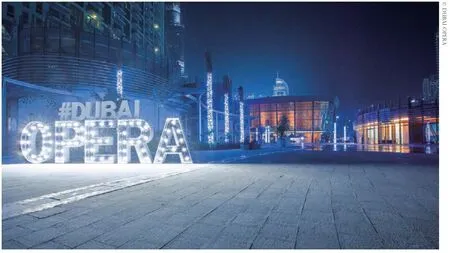
迪拜歌剧院夜景
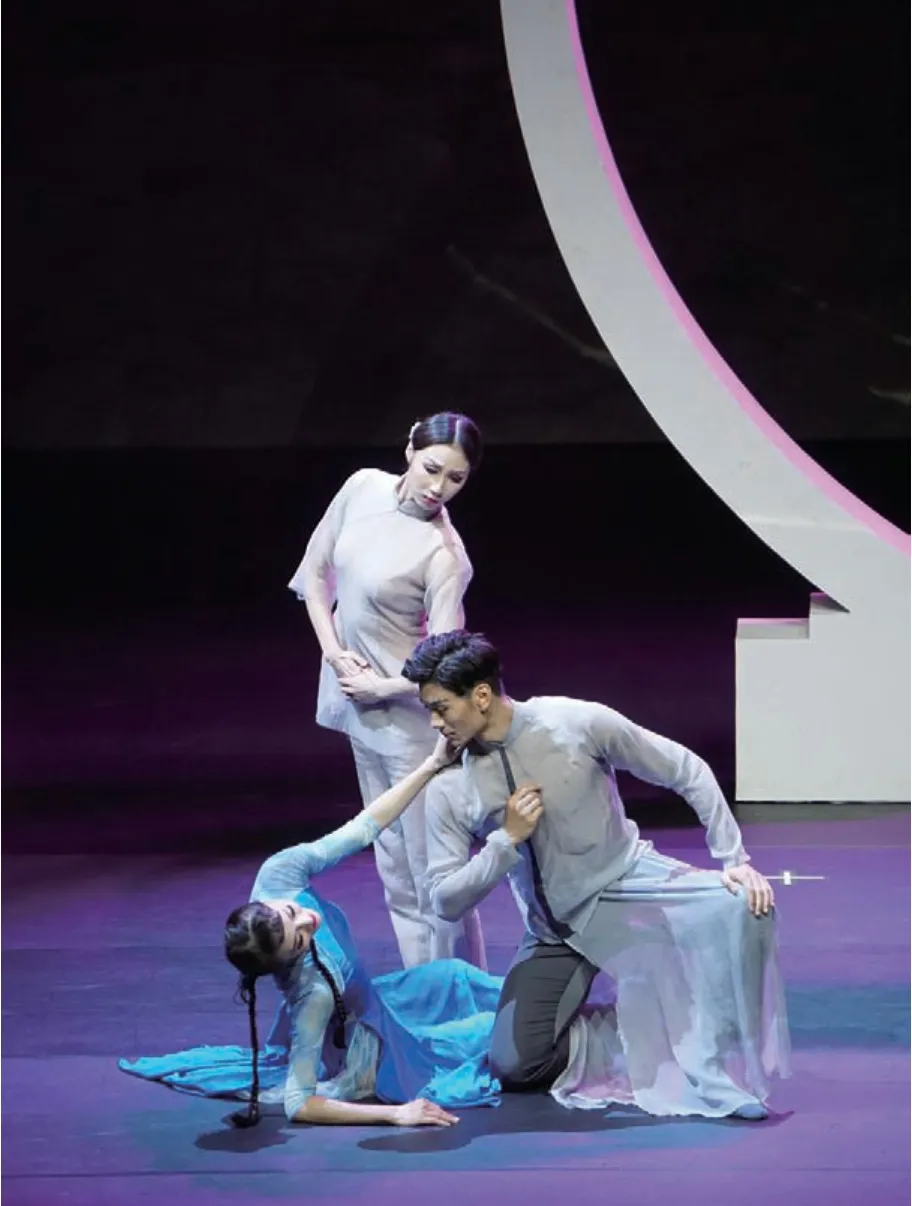
上海歌剧院此次到访迪拜,还带来了一部原创舞剧《早春二月》(摄影:蒋海瑛)
It was perhaps not the most intuitive career move,forsaking a long-established institution for a start-up in the cultural desert, but after three years and some 600 performances, Jasper Hope sill has no misgivings in leaving London’s Royal Albert Hall to become the inaugural CEO of the 2,000-seat Dubai Opera House.If anything, the mix of classical and populist offerings that made the RAH so beloved in British culture was precisely the right card to play in Dubai, where the territory’s particular mix of local residents and cosmopolitan work force is getting its first taste of the international stage.
Hope certainly came with the right background and connections for the job. Born in South Africa the son of novelist Christopher Hope, the young Jasper made his way to Europe with his family, his mother eventually becoming the personal manager of legendary violinist and conductor Yehudi Menuhin. His brother, the violinist (and recently turned conductor) Daniel Hope,has lately been known to grace the Dubai Opera stage.From its opening in 2016, each evening at the Dubai Opera, from Plácido Domingo’s opening gala to a three-week run ofLes Misérables, has become not just a performance but a way of linking Dubai with the rest of the world.
Though the Dubai Opera is an unapologetically commercial venture—the facility was built and managed by the real estate developer Emaar Properties and is located next to the Dubai Mall—its mercantilist nature in no way dilutes its internationalist spirit. For Hope, his early step in setting up an Arabian outpost of the BBC Proms—a key part of his old job at the RAH—was simply picking the proverbial lowhanging fruit. A more thoughtful look at Dubai’s population has led to such bookings as the Londonbased sitar virtuoso Anoushka Shankar (daughter of Ravi Shankar), giving a nod to the territory’s Indian residents, and Broadway star Lea Salonga, inspired by Dubai’s Filipino community.
When it comes to presenting opera, though, Hope iswell aware that much of his audience will be seeing the work for the first time. That openness, combined with Hope’s expanding internationalist spirit, has brought him to look well beyond the obvious European capitals. In a quiet moment during the Shanghai Opera House’s recent residency in Dubai, Hope explains why he looked to China for the territory’s first Turandot.
How did you come to invite the Shanghai Opera House to Dubai?
I’ve wanted to do a production of Turandot ever since opening Dubai Opera three years ago, but it’s a very complicated show. The opera requires a lot of people, and to be perfectly honest there are many productions around the world which aren’t of the right quality for me to bring Turandot to the stage in Dubai for the very first time. It took me a while, but eventually I found the right partners in the Shanghai Opera House. They had a fantastic production, which was also quite suitable to open our fourth season.
It is, I suppose, quite an advantage for you to be presenting a Chinese story done by a Chinese opera company.
Yes, I think it’s extremely important that we’re having a Chinese opera company do Turandot. But although the story is Chinese, the composer was Western, so the piece already has a link between East and West.And where better—at least we think—to present that production than in Dubai? Right in the middle,somewhere on the Silk Road between Europe and Asia.
There was a substantial turnout for opening night.Has the response here always been like that here?
I was delighted with the audience we had for all three nights of this production. You never know when you start out whether something will be popular or not, but for three years we’ve built a fabulous audience for Western opera. I would’ve been surprised on opening night to find an empty seat in the house.
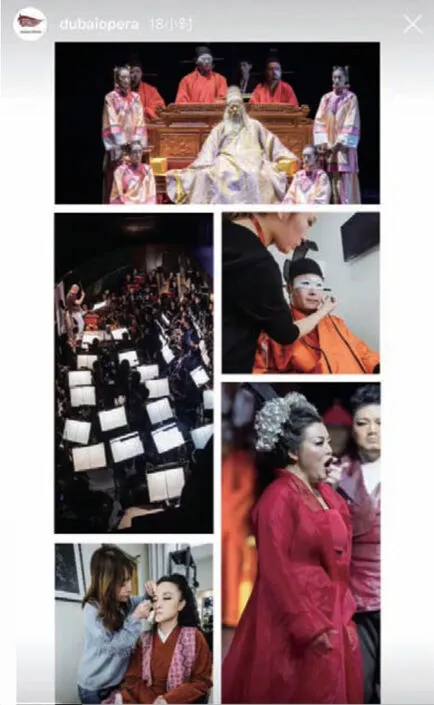
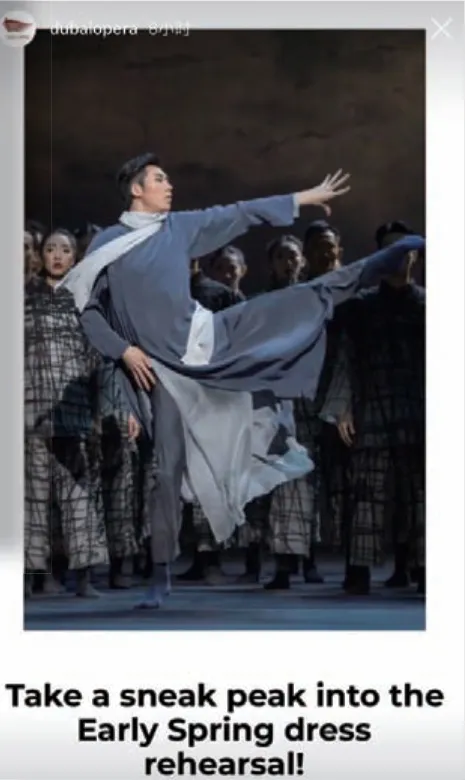
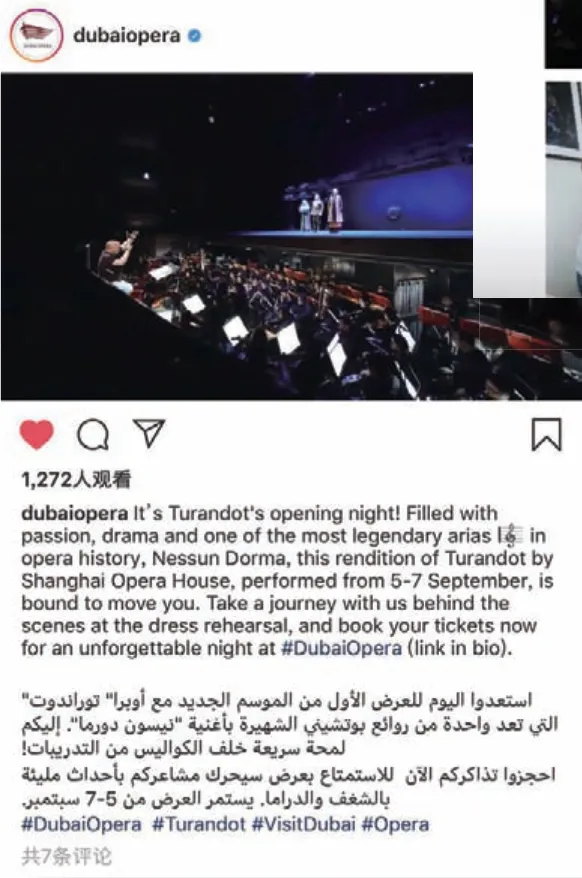
迪拜歌剧院方面对此次上海歌剧院的演出剧目所做的宣传
You’ve worked in many places where operatic standards are world-class. What was it about the Shanghai Opera House’s production that convinced you that this was the right Turandot for your audience?
When I first saw this production in rehearsal, many things struck me. First of all, the scale of it is fantastic:There are so many people on stage. But apart from the sheer numbers, what struck me was that the set itself is actually quite simple and beautiful. The use of projections to keep the scene visually interesting also helps in telling the story. It’s a very clever device that presents a complicated story in a simple way. I’m sure Dubai audiences, when they saw this opera forthe first time, were completely taken in. All the way through, my eyes kept being drawn to different things:the projections, the colors of the costumes, the way the lighting design works to illuminate everything on stage. Of course, you get Puccini’s magical music and the singing, but visually it’s just an enormous spectacle. That’s what I was most excited about.
Clearly it took a long time to plan a collaboration like this. What was the process like?
It took a great deal of effort on both sides. The Shanghai team conducted a very extensive visit a long time ago to discuss repertory and how many performances there should be. Then we began the logistical discussions. I visited Shanghai last year, not only to speak at the World Cities Culture Forum but also to continue discussions with the company. The process was complicated, but I have to say that it was a pleasure to work with such a professional company that had this much history with touring. Whenever you run into problems, you need a good deal of confidence and experience to solve them. It was a fantastic collaboration and we hope to have a successful relationship in the future
You have a very broad mix of classical music and commercial events at the Dubai Opera House. How many Western operas have you presented?
I believe it’s 10 so far. We opened withThe Pearl Fishers, and then—I don’t quite remember the order—there was alsoThe Barber of Seville, the three Mozart-Da Ponte operas [The Marriage of Figaro,Don GiovanniandCosì fan tutte],Madame Butterfly,La Bohème,Carmen, Aida, and nowTurandot. In terms of companies—again, in no particular order—we’ve had the Polish National Opera, the Welsh National Opera,and coming up in March we have a production ofLa Traviatafrom the Ukrainian National Opera in Kiev.
So in the mix of everything you present here, whatrole would you say Western opera holds?
We find it tremendously important, though not necessarily in terms of volume. The audience here is great and supportive. They come to see everything we offer—not just opera but also ballet and classical music.But there’s simply not enough of a population in Dubai for us to do only opera, or even a full opera series every season. So it tends to be one or two titles, a couple of times a year—usually in February or March, and again in September. Depending on the size of the production,we usually have two titles per company. The Shanghai Opera House did two productions, of course, but one of them was the dance pieceEarly Spring.
Ah, I just remembered—we’ve also doneEugene Onegin, soTurandotis our 11thopera. Again, I have a small audience. I hope we’ll all get more adventurous in time, but we started from nothing. There was no theatre here before, and there’s still nothing else now.The way we want to proceed, I make no bones about it, is to start with the classics.
The only big omission I see on your list so far is Tosca. Was that a conscious decision? I recall that the show’s Catholic imagery had been a barrier at the Royal Opera House in Muscat because of the religious sensitivities in Oman.
Of course, we’re in a Muslim country, and there are sensitivities. But that said, we have Handel’sMessiahcoming later this year. We have European standards of tolerance. In my limited experience here, I’ve found that Dubai welcomes everything. Other countries in the region are different, but here the idea that you can’t perform a famous piece of sacred music that’s been part of the broader culture around the world for hundreds of years is simply not an issue.
Who will you have performing Handel?
It’s a mix of forces. There’s a local chorus we’ve been supporting: the Dubai Opera Festival Chorus,that I started with the BBC Proms performances here.This year for the Proms we did Beethoven’s Ninth Symphony. So we have the chorus already. For the orchestra, we have a production ofThe Nutcrackercoming from St. Petersburg in the first week of December. At the end of that run, I’m sending the dance company home but keeping the orchestra. So this year, our audiences will get the usual holiday double bill of Handel and Tchaikovsky.
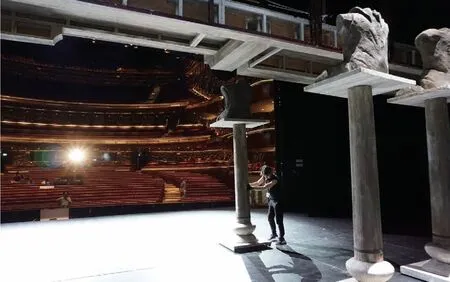
霍普表示,上海歌剧院是一个专业且具有多年巡演经验的团队(摄影:蒋海瑛)
It is interesting that you started with a chorus.Have you thought about developing other resident companies under Dubai Opera House?
No, but not because I wouldn’t want that to happen.As you know, in order to develop things like that we would need a lot of other things in place that are way beyond my control. We don’t have a conservatory in this country, for one thing. We don’t have the same standards of musical education, even at the amateur level. Will that change? Yes, I hope so. Is the purpose of an opera house here in part to inspire some of these things? Absolutely. Have we started? Yes, with the chorus I just mentioned. Can we eventually do an orchestra? I don’t know, but the process is one of stages. If someone establishes a music school then we can start to put more of our ideas in place. I don’t want to just buy an orchestra and import it. That would not be developing what we need locally. We could establish something like that as a partnership, and there are certainly some options in that regard we could look at. But for me, it’s important develop things like this organically.
We were discussing the size of the audience a few minutes ago, but what about the quality? What are they like?
We have all kinds. The opera audience is likely to dress a bit smarter, but it will largely be the same people. You have the usual corporate types,mostly professional people, and predominantly an international population. And then you have people who’ve heard about us and what’s going on here and think, well, let’s give it a go. In that way, the transient nature of Dubai often helps us, because you always have people coming in and looking with fresh eyes at what the city has to offer. What you willnotsee is a hugely experienced opera audience. Many of them—perhaps most—will not know the story. They might knowNessun Dorma, but they won’t know the rest of the music. Some of them might be surprised to find there are two intervals. But I don’t have a problem with that. I want them to enjoy the experience. And if it’s their first time…well, that’s even better.
